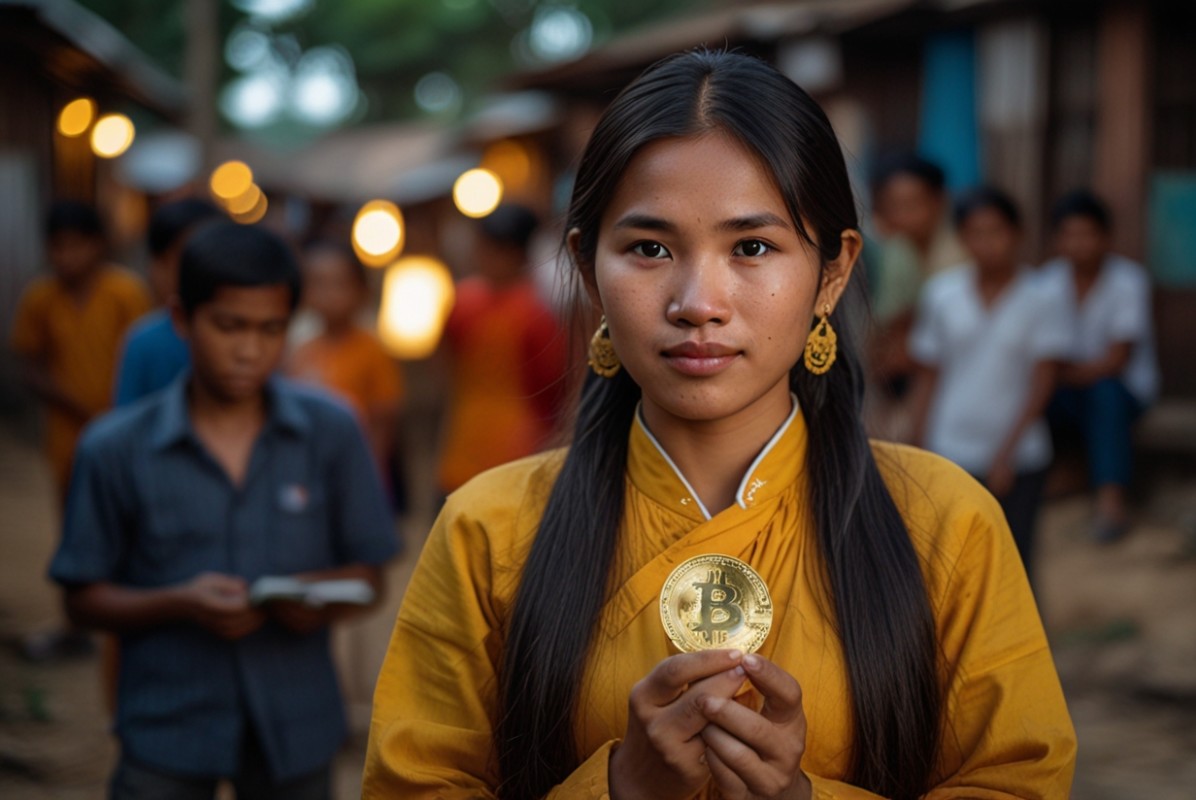Bitcoin: New Hope for Innovators in a Corrupt Economy


In a world where “talent is everywhere but opportunity is not,” existing fiat systems perpetuate the gap between those with access and those without resources. Even in flawed democracies, people generally enjoy stable currencies, freedoms, and the rule of law. These features create an opportunity-rich environment that does not have to determine where a person’s life begins and ends.
Bitcoin advocate and best-selling author Lyn Alden is a prime example of overcoming obstacles and taking advantage of the opportunities offered by a democratic society. Despite experiencing years of homelessness, she worked hard to become a prominent figure in the financial world. Her story is not unique. Many refugees fleeing war and persecution have found ways to adapt, innovate, and thrive in their new lands, contributing greatly to their adopted communities.
For example, WhatsApp co-founder Jan Koum grew up without electricity in Ukraine and spent several years cleaning grocery stores before finally finding success after moving to the United States. PayPal co-founder Max Levchin tweeted About how he escaped persecution in Russia and succeeded in America. “I and my family, and thousands of other Soviet Jews like us, came to the United States as refugees in ’91, fleeing a regime that persecuted us for who we were.Another surprising immigration success story is that of Mai Lee Chang, who was born to Vietnamese parents in a Thai refugee camp and knew only the English word “toilet” when she started school in the United States. She is currently an engineer contributing to NASA’s mission to Mars.
However, the situation is significantly different in authoritarian regimes, where an individual’s potential is often determined by the circumstances of his or her birth. Typically in such places, if you are not born into a family with ties to corrupt officials, that is, if you are not rich, your ability to innovate and be entrepreneurial is systematically suppressed. Under this system, the fiat money system is not based on merit, but rather is rigged to benefit such ‘honorable children’. In other words, the system is based on nepotism, family ties, and corruption.
In the past, before the Internet and smartphones, ordinary individuals living in hostile environments simply accepted the harsh reality that they were destined to serve dictators and their families. But today, Bitcoin has emerged as more than just a technology. It serves as a gateway to financial empowerment without compromising moral values. This provides a powerful tool to break through the many concrete barriers erected by oppressive governments.
The experience of Swan Htet Aung (Swan), an AI entrepreneur in Myanmar (formerly Burma), shows how Bitcoin can provide a lifeline to individuals facing the harsh reality of having to start from scratch without money or family connections. After founding her AI company in 2016, Swan’s startup grew quickly, generating more than $300,000 in annual revenue by 2020.
Swann recalled the defining moments following the February 2021 coup, emphasizing the importance of Bitcoin in maintaining financial health. Four days after the military takeover, he withdrew his company’s cash and converted it to Bitcoin and USDT. He made this decision just weeks before the Bank of Myanmar was able to control company assets by restricting withdrawals from individuals and businesses. Unfortunately, his choice to keep his remaining USD assets in the bank led to the company losing a significant portion of its financial assets when the Myanmar regime enacted extreme new monetary policies designed to preserve USD for its war machine. This policy, announced by the Central Bank of Myanmar on April 3, 2022, forced the conversion of Swan’s USD reserves into Myanmar’s local currency (Myanmar Kyat), which plunged at a price 30% below the market rate, without Swan’s consent.
The new policy stipulated:Residents of the country must repatriate foreign currency earnings earned abroad to Myanmar. These profits are sold and exchanged for Myanmar Kyat within one business day through banks holding an Authorized Dealer (AD) license by opening a foreign currency account in Myanmar.”
People living in countries with fairer and more just legal systems may find it difficult to understand such oppressive financial policies. However, Myanmar actually has a history of centralized financial institutions wielding the power to oppress its own citizens. An infamous example occurred in 1987 when the government suddenly demonetized the 25, 35 and 75 Kyat banknotes, effectively eliminating 80% of the currency in circulation in the economy overnight.
More recently, following Myanmar’s violent military coup in 2021, the Burmese military used tactics such as freezing the bank accounts of activists, journalists, and anti-coup supporters, further demonstrating the regime’s tactics of suppressing people through the fiat financial system. . Unfortunately, such abusive policies are often effective in places like Myanmar. There, people are so preoccupied with ensuring their physical survival, getting food on the table, and maintaining shelter that they have little energy or interest to challenge or fight. I am against injustice.
Before 2010, Myanmar’s mobile phone ownership rate was lower than North Korea’s, and dictator Than Shwe’s regime curbed internet use by spreading propaganda that the internet was merely a place for adult videos. But things changed dramatically in 2016, when social media, affordable smartphones and cheap SIM cards became widely available to most people.
Initially, Swan, a Myanmar entrepreneur, thought of returning to Myanmar after coming to the United States at the age of 32 for a GenAI event hosted by AWS in San Francisco to learn and gain new experience. However, while he was on the move, the Burmese military instituted a mandatory conscription law that drastically changed the trajectory of his life. This law, combined with the financial instability caused by central bank actions, widespread social and economic injustice, and the country’s overactive surveillance system, led Swan to decide to stay in the United States longer. He now hopes to go on to obtain an O1-visa. He can do his job and rebuild his dreams in an environment where there are more opportunities for innovation and development. Although the United States has its own inequality and domestic problems, many foreigners still view the United States as the best destination to pursue their dreams and believe that if they work hard and innovate, they can succeed.
In conversation for this article, Swan talked about the early days of his business in Yangon, Myanmar’s largest city. Swan founded the AI software company with two friends in 2016. During this time, after more than half a century of isolation, Myanmar underwent major reforms and participation in the global community gradually increased.
“In Myanmar, labor costs are cheaper than subscribing to software,” Swan said. “It makes sense for a business owner to hire an employee at a salary of $100 per month and assign them multiple tasks regardless of whether they are within or outside the scope of their job, as opposed to a chatbot for customer service.” While AI job replacement is increasing in developed countries, exploitative labor conditions and cheap labor costs will always outpace AI in developing countries. There are many ethical issues that need to be addressed, at least in places where electricity is limited and there is no democracy (of course, low wages and sweatshop working conditions also trump AI).
Swan shared the initial challenges of starting up. “We spent most of 2016 just developing the product because we didn’t have a single customer. I worked a side job and lived with my parents in a rented apartment, while the other two co-founders left to pursue other full-time opportunities.”
Mr Swan, who speaks Burmese and English fluently, said he faced social restrictions in raising funds because Myanmar is an emerging market. Additionally, there were fundamental social barriers. He had never worked abroad or earned a degree from a university in Yangon. Unlike the privileged ‘crony kids’, Swann lacked privilege, which is why his startup is expected to generate $300,000 in annual revenue in 2020 and compete with companies like Samsung, Unilever, Carlsberg, Nivea, and many more.
If a protocol-based funding system like Bitcoin were made available to entrepreneurs in developing countries, talented individuals like Swan could scale their startups regardless of their socioeconomic status or whether they hold a prestigious degree.
Bitcoin may be viewed as an investment asset class in developed countries, or may be misunderstood as an environmentally destructive technology, but it is a lifeline and money for talented individuals in developing countries trapped in unfair currency systems, providing access to global capital markets. It means. This mainly benefits the privileged ‘tribal children’. These talented individuals cannot afford to participate in the unfinished global debate about Bitcoin. Rather, they are desperately trying to escape the shackles of economic oppression. Fortunately, Bitcoin standards allow individuals to access opportunity and financial freedom, ultimately contributing to a more equal and prosperous global community.
This is a guest post by Win Ko Ko Aung. The opinions expressed are solely personal and do not necessarily reflect the opinions of BTC Inc or Bitcoin Magazine.



